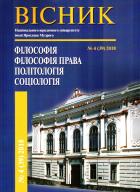СОЦІОЛОГІЯ МІСТА: ВІДПОВІДІ НА ВИКЛИКИ СУЧАСНОСТІ
SOCIOLOGY OF CITY: ANSWERS AT CHALLENGES OF MODERNITY
Author(s): Svitlana Vyktorivna KutsepalSubject(s): Law, Constitution, Jurisprudence, Sociology, Rural and urban sociology
Published by: Національний юридичний університет імені Ярослава Мудрого
Keywords: city; socium; social transformations; identity; megalopolis; Homo Urbanus;
Summary/Abstract: Problem setting. In modern society, there is a constant increase in the proportion of the urban population and, respectively, there are changes in the demographic structure of the society. In modern sociological discourse, the city is interpreted as a kind of chronotope with specific characteristics and attributes reflected on the conditions of human life and contributing to the formation of specific urban mentality. The problem of developing new patterns of behavior that will provide comfortable and maximally possible conflict-free city dwellers ’ coexistence and a new type of urban identity - Homo Urbanus - is emerging.Recent research and publications analysis. The problems of the city, interpretation of the latter as a social space and city dwellers as a specific social force is researched in works by A. Badiou, Z. Bauman, W. Benjamin, J. Baudrillard, L. Beck, P. Berger, E. Giddens, E. Laclau, H. Lefebvre, T. Luckmann, C. Mouffe, A. Schlesinger and others.Among domestic researchers, it is necessary to mention T. Vozniak, M. Karpovets, M. Prepotenska, D. Rizhkova, N. Hamitov and others.Paper objective. The paper is aimed at analyzing the specific features and characteristics of being of a modern city, its influence on the formation of its dwellers’ ideological orientations and behavioural patterns.Paper main body.The rapid development of cities, in particular, megalopolises, is a consequence of the transformational processes taking place in the modern world. Life in the city, especially in the big city (megalopolis, metropolis, agglomeration) is characterized by speed, mobility; it demands from its residents the ability to react to changing circumstances instantly, conquer their own selfish interests and needs by the rules of coexistence in the topos of a large city, adapt to the urban way of life.Along with virtually unlimited opportunities for personal and social growth, there are also dangers and troubles awaiting for city dwellers such as loneliness, social insecurity and disorientation, property and household differentiation, emotional, psychological and informational violence. These increase the risk of loss of the existential meaning of being and development of city dwellers ’ depression and suicidal attitudes, as their personality is not generally perceived by others, enthralled by problems of their own survival and comfort.The city is a topos for the development ofnew types of identity depending on the social origin and position of the city dwellers, their social roles and the environment. This is reflected in the concept of Homo Urbanus (urban man) as a new type of urban identity.Conclusions of the research. The city creates favourable conditions for personal and cultural development, social growth, realization of the individual’s potential opportunities; it provides satisfaction of its dwellers’ communicative, heuristic and career needs.In modern changing and flowing world, the city cannot remain stable. The city is also constantly changing and transforming, so the traditional types of identity, which were previously influenced by demographic, social, professional traits, are losing their meaning, becoming fluid and mobile, giving way to Homo Urbanus.
Journal: Вісник НЮУ імені Ярослава Мудрого. Серія: Філософія, філософія права, політологія, соціологія
- Issue Year: 39/2018
- Issue No: 4
- Page Range: 45-52
- Page Count: 8
- Language: Ukrainian

